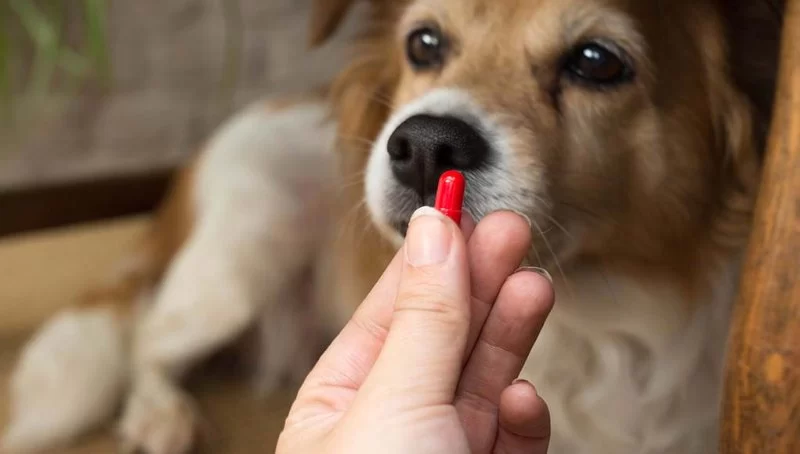Understanding Canine Anxiety and Why It Happens
Just like humans, dogs can experience anxiety — and it’s more common than many owners realize. From thunderstorms to separation stress, anxious dogs can show symptoms such as shaking, barking, chewing, or pacing. These behaviors are their way of coping with fear and uncertainty. While prescription medications are an option, more pet owners in the U.S. are turning to natural pet anxiety medications for dogs because they are gentler, safer, and often just as effective.
According to veterinarians, anxiety in dogs can stem from multiple causes: genetics, past trauma, lack of socialization, or sudden environmental changes. Recognizing these triggers early helps you choose the right calming remedy before the problem worsens. At Hidden Brook Veterinary, specialists often emphasize the importance of holistic approaches that combine behavior modification with safe natural treatments.
The Science Behind Natural Anxiety Relief for Dogs
Natural calming solutions work by gently regulating the nervous system rather than suppressing symptoms. Ingredients such as valerian root, chamomile, and L-theanine can increase serotonin production, promoting relaxation without sedation. Unlike synthetic drugs that may cause side effects like lethargy or appetite loss, these compounds support a more balanced mood and long-term calmness.
1. How Natural Remedies Interact with a Dog’s Body
Dogs metabolize natural compounds differently than humans. For example, chamomile acts as a mild sedative, while L-theanine (found in green tea) enhances alpha brain waves, helping dogs stay calm yet alert. This makes natural remedies ideal for situations like travel, vet visits, or fireworks — when you want to soothe anxiety without dulling your pet’s senses.
2. Why Veterinarians Recommend Natural First
Veterinarians across the U.S. increasingly advocate starting with non-pharmaceutical options. The reasoning is simple: natural treatments minimize long-term risks and can be used daily or intermittently. If these don’t provide full relief, they can safely be combined with prescribed medications under veterinary supervision.
Top Natural Pet Anxiety Medications for Dogs
Not all anxiety remedies are created equal. Choosing the right product depends on your dog’s personality, health history, and triggers. Here are some of the most trusted and effective natural calming solutions available in the U.S. today.
1. Valerian Root
Valerian root is one of the oldest known herbal remedies for anxiety. It acts on the same brain receptors as mild sedatives, easing restlessness and panic in dogs. It’s especially effective for nighttime anxiety or fear of loud noises. Always follow veterinary dosage advice, as higher concentrations can cause drowsiness.
2. Chamomile
Chamomile has natural anti-inflammatory and anti-anxiety properties. Many pet owners brew chamomile tea and mix a small amount with their dog’s food or use chamomile-infused treats. It can help dogs who struggle with separation anxiety or frequent nervous energy.
3. CBD Oil for Dogs
CBD oil derived from hemp has become one of the most popular natural anxiety solutions for pets in the U.S. It works by interacting with the endocannabinoid system — helping to stabilize mood, reduce hyperactivity, and improve sleep. Studies have shown that CBD can significantly lower stress levels in dogs during thunderstorms and travel.
When choosing CBD products, opt for organic, THC-free formulas made specifically for pets. The experts at Hidden Brook Veterinary recommend starting with small doses and monitoring your dog’s response before increasing the amount.
4. L-Theanine and L-Tryptophan
Both amino acids are proven to reduce anxiety without sedation. L-theanine supports calm alertness, while L-tryptophan helps produce serotonin, the “feel-good” hormone. These are often found in over-the-counter calming chews or supplements for dogs with moderate anxiety symptoms.
5. Passionflower and Ashwagandha
Passionflower promotes tranquility and reduces hyperactivity, while ashwagandha — an adaptogenic herb — helps the body resist stress and fatigue. These two herbs are often combined in advanced natural formulations that offer balanced mood support for dogs of all breeds.
Recognizing the Signs of Anxiety in Dogs
Before choosing a treatment, it’s essential to recognize anxiety symptoms correctly. Common signs include excessive barking, destructive chewing, trembling, pacing, or changes in appetite. Some dogs may hide, while others become clingy or aggressive. Understanding these behaviors helps you tailor a more effective calming plan.
1. Situational Anxiety vs. Chronic Anxiety
Dogs can experience anxiety in two main forms. Situational anxiety happens in response to specific events — like fireworks or car rides — and can often be managed with short-term remedies. Chronic anxiety, on the other hand, requires consistent treatment and may benefit from daily supplements or professional behavior training.
2. The Role of Routine and Environment
In addition to natural medications, maintaining a stable routine and calm environment can significantly reduce anxiety. Simple actions like playing soft music, using pheromone diffusers, and giving consistent affection can make a big difference.
Real-Life Story: How Natural Remedies Helped Luna
Luna, a three-year-old rescue dog from Texas, suffered from severe separation anxiety. Her owners noticed she would cry and scratch the door every time they left. After consulting with veterinarians at Hidden Brook Veterinary, they started her on a small dose of CBD oil combined with behavioral training and chamomile chews. Within a few weeks, Luna became calmer, slept better, and could stay home without panic. Her story reflects what thousands of pet owners experience — that natural anxiety remedies, when used correctly, can truly transform a dog’s emotional health.
Tips for Safely Using Natural Anxiety Medications
While natural remedies are generally safe, misuse or incorrect dosing can lead to unwanted side effects. Always consult your veterinarian before introducing any supplement or herbal treatment. Every dog has unique metabolic needs, and a vet can help tailor the best approach.
1. Combine Natural Remedies with Behavior Therapy
For lasting results, natural medications should complement consistent behavior training. Teaching calm responses through desensitization and positive reinforcement helps your dog gain confidence over time.
2. Monitor Progress and Adjust Dosages
Keep a diary of your dog’s behavior before and after treatment. If you notice positive changes — such as reduced pacing or calmer reactions to triggers — continue with the regimen. If not, consult your vet for dosage adjustments or alternative treatments.
When to Consult Hidden Brook Veterinary
Some dogs have deep-rooted anxiety issues that require professional care. At Hidden Brook Veterinary, experienced veterinarians can assess your dog’s emotional and physical health to determine whether natural medications, behavioral therapy, or prescription support is best. Their approach prioritizes compassion, science, and safety — helping every dog live a calmer, happier life.
If your dog is showing signs of chronic stress or fear, seeking expert advice ensures you make informed choices that truly support your pet’s well-being. With the right plan, natural anxiety relief can become a safe, effective part of your dog’s daily routine.












